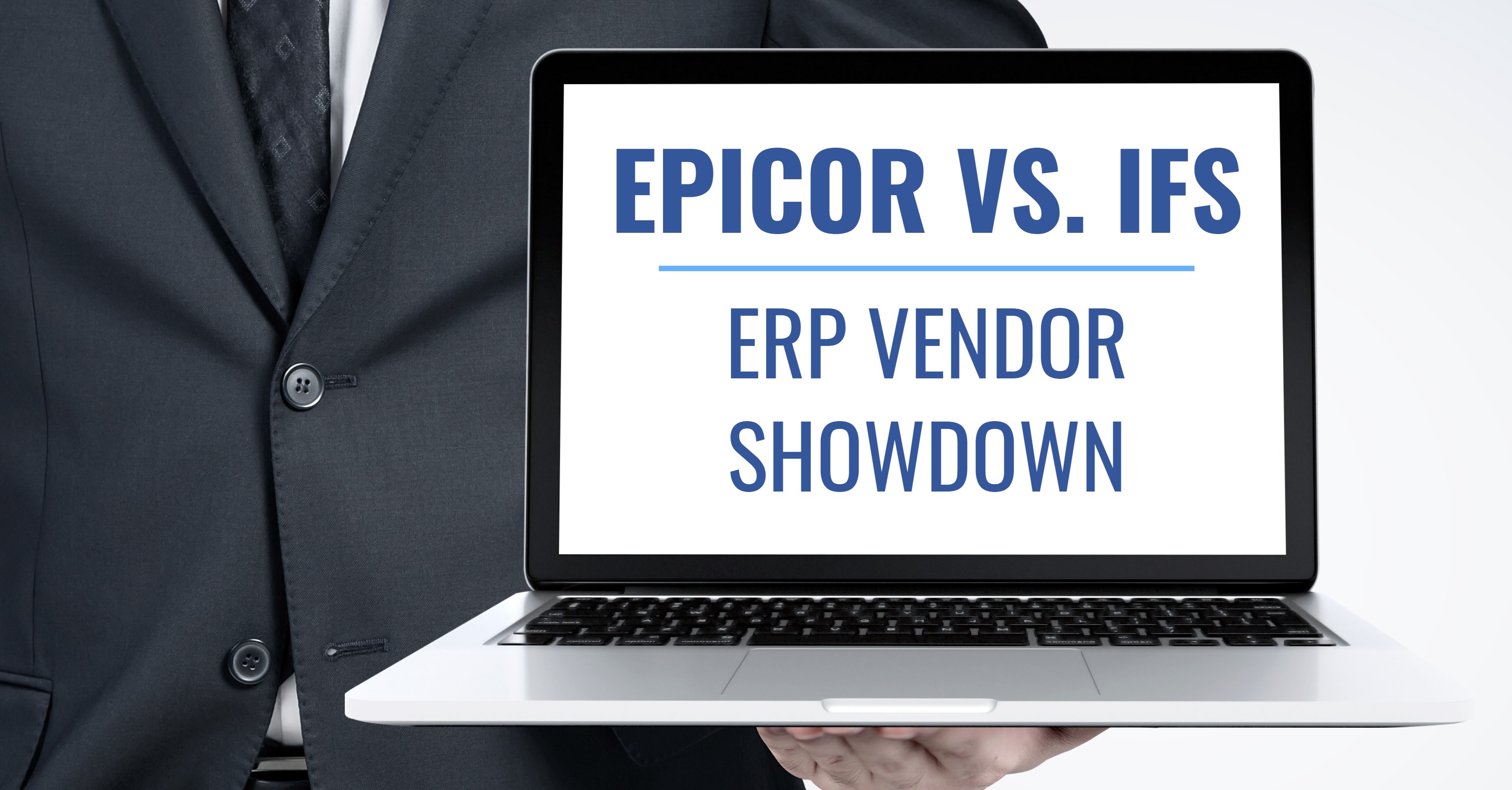Epicor® vs IFS
Which ERP Should You Choose?
The ERP selection process is no cakewalk. Every vendor boasts having the most innovative solutions, superior flexibility, intuitive user experiences—you get the idea. But when it comes down to the nitty-gritty, who really comes out on top? Which solution truly maximizes your efficiency and optimizes your manufacturing or distribution processes?
To guide you in your search for the right ERP software, we’ve pitted two of the top providers against each other: Epicor and IFS. Both have built robust enterprise solutions for manufacturers and distributors for decades, but which one should you choose to serve as the backbone of your operations? We’ll compare the two vendors to help you make the best software investment for your enterprise.
Global Management
IFS is a global enterprise software vendor that has earned a strong reputation, particularly in Sweden, for its functional ERP systems. However, it has a weaker presence in the U.S. and lacks the multi-company capabilities of Epicor. A vendor that serves clients in over 150 countries, Epicor designed its ERP solutions with an array of features for robust global manufacturing and distribution performance.
One of these features is the Epicor Multi-Company Management module, which automates inter-company fiscal transactions and enables users to easily access data across locations from a single login. Additionally, its Country Specific Functionality (CSF) supports an array of international and regional accounting and reporting mandates to help you maintain stringent compliance standards. You can also support country-specific language needs without tampering with the base code. Another feature is the Multicurrency Management module, which automates currency conversion, buying and selling to assist you in making the most lucrative transactions and business decisions.
Designed with manufacturers and distributors in mind, Epicor knows the importance of maintaining visibility and efficiency across global supply chains. Few ERP providers can match the performance of Epicor’s multi-site capabilities, making Epicor a clear winner in this category.
Software Integration
Both IFS and Epicor are known for including comprehensive applications and modules that work together cohesively. But to gain a 360-degree view of processes, manufacturers and distributors would be wise to integrate their ERP software with front-end systems, such as CRM or eCommerce. By syncing information between your front and back-office systems, you reduce manual data entry and gain a complete view of your enterprise to reduce errors and increase efficiency.
There’s just one catch: IFS doesn’t easily integrate with external systems. Connecting IFS applications with outside vendors often requires extensive customizations that can put your investment at risk and raise the project cost. Epicor, on the other hand, can be integrated with other systems without requiring complex coding or programming.
Furthermore, Epicor ERP uses REST API, a web service interface that facilitates optimal cloud software connectivity. REST API provides greater flexibility to reduce errors as your programs transfer data back and forth. With REST API, Epicor achieves optimal responsiveness, so your systems can communicate with each other and provide up-to-date data.
System Modifications
Every business is different, meaning that ERP rarely serves every need right out of the box. Therefore, it’s critical that manufacturers and distributors seek out a solution that not only includes robust built-in features but also facilitates modifications. With few customization options, IFS easily loses to Epicor in this category. Epicor is known for rich configuration features that make it easy for businesses to align their software to their unique operations.
Epicor simplifies customizations by including a built-in customization engine that enables businesses to make changes using clicks instead of code. This capacity to modify several settings without touching the base code is essential for ensuring your software supports your business processes while mitigating risk. By making ERP customization easier than ever, Epicor provides system flexibility without exposing your business to the risk and expenses that often accompany complex software coding.
Ease of Use
IFS and Epicor both set the bar in terms of usability. With responsive designs and drag-and-drop functions, their intuitive interfaces empower users to maximize their insight and productivity. But once again, Epicor is a step ahead of the competition. IFS is limited in its functionality. It doesn’t automate approval flows or show related data points on a single screen. It also makes some tasks difficult, such as modifying forms and fixing errors in purchase orders.
Epicor offers a robust user experience by providing a personalized, comprehensive home page. The home page consists of built-in business intelligence, KPIs and metrics to give you critical insight out of the box. Furthermore, users can easily create their own view. That means they can populate their page with relevant metrics and charts, so they can easily drill down into their most necessary data. By providing a wealth of information on one screen, Epicor equips users with superior visibility to drive productivity and decision-making.
Wrap Up
When it comes to finding the right ERP solution for your enterprise, the devil is in the details. IFS and Epicor both provide comprehensive tools for manufacturers and distributors, but analyzed under a magnifying glass, Epicor comes out ahead. Epicor’s industry-specific solutions include the global management capabilities, integration support, simplified customizations and ease of use necessary to elevate your enterprise.
If you’re looking to boost your business practices, make the right choice: Reach out to our expert consultants today to start your ERP implementation!

